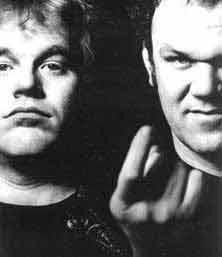I thought I'd take a look back on Adaptation, since it was almost 10 years ago. College students should take a look at everything Charlie Kaufman has written, and I think many of them will. This one is especially needed, because it deals with the struggles of filmmaking and screenwriting. Also, it might be nice to remind kids (with Season of the Witch and some other awful thing just around the corner) that Nicolas Cage can be good.... if he applies himself....
The creative minds that brought us Being John Malkovich have created another unique cinematic experience. Director Spike Jonze and writer Charlie Kaufman team up again to show how Kaufman’s alleged troubles in adapting a book to the screen cause all sorts of adventures.
Nicholas Cage stars as Kaufman and his twin brother, Donald. The brothers are both struggling to get into the screenwriting business. Charlie, the shy one, timidly tries to adapt Susan Orlean’s book, The Orchid Thief. Donald, the partying, outgoing one, comes up with action filled but extremely typical plots. Charlie watches with horror as Donald gets all the recognition, and all the women.
The movie then shifts to Orlean’s perspective as she tries to write her book. Meryl Streep does well as the polite but internally dreamy Orlean. She travels to Florida to find John Laroche (Chris Cooper), a man obsessed with orchids. Laroche has been arrested several times for going into Florida swamps and poaching orchids. Orlean is fascinated with his love for the flower.
Meanwhile, Charlie struggles with his writer’s block to adapt Orelan’s novel. He thinks he needs more to make a full-length script out of it, so he and Donald plan to investigate Orlean for more information. Charlie keeps struggling while Donald gets more and more recognition. Charlie, the anti-Hollywood iconoclast, eventually gives up and attends a seminar hosted by famed screenwriter Robert McKee (Brian Cox in a hilarious cameo). He takes the advice.
Much of the film is really an assault on typical Hollywood formulas. Kaufman shows the divide between art and popularity beautifully with his twin brother. Charlie’s refusal to do typical things like car chases and drug scenes only emphasizes his distaste for popular cinema. The ending of the film itself is a play on these ideas. From start to end, this film has a lot to say about the current state of film in general.
Kaufman could not have found many better actors for his strange story. Cage does an amazing job as two separate characters. He pulls off the shyness and impudence of Charlie as well as he does the easygoing manner of Donald. A good chunk of the film, really, is him talking with himself as two different people. Streep shows Orlean’s obsession with a man who really knows what an obsession. Cooper steals the scene with his hilarious performance as Laroche, especially when the good-natured yokel has to get serious. There are quite a few recognizable cameo appearances, like Cox and Ron Livingston, that add to the weird humor of the film.
Jonze shows once again why he is one of the hottest young directors in Hollywood. He takes Kaufman’s multi-dimensional story and goes boldly into each dimension with ease. From serious conversation scenes to Charlie struggling to car crashes and action-packed sequences, Jonze handles it all while keeping in mind the errant humor of the script.
This is easily one of the best films of 2002, but it may not reach all audiences because, really, of what its main point is- it is not your typical Hollywood formula piece. It is a wild ride through unconventional waters, and it pokes fun at what isn’t. It is a funny, strange, and unpredictable way to experience the world. Kaufman and Jonze know how to make us laugh and scratch our heads all at the same time. Adaptation is a film that needs to be understood in relation to the norm of films today to get its wonderful lessons.

